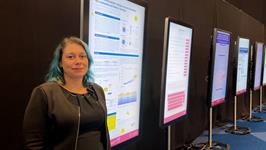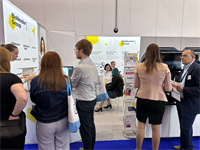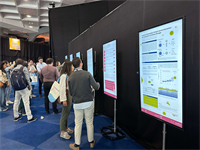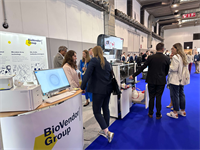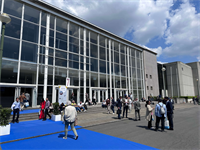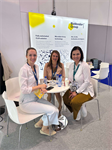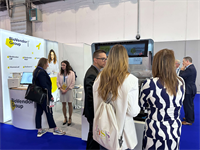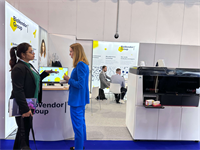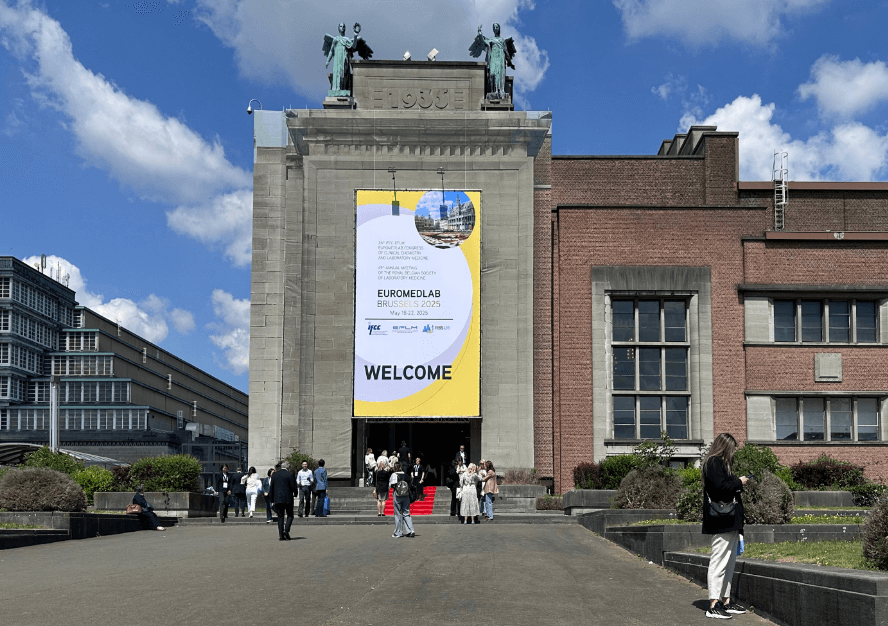
Brussels is not only the political heart of Europe, but for a few days in mid-May, it also became a centre of global laboratory medicine. The 26th edition of the prestigious EuroMedLab congress was held at Brussels Expo, attracting thousands of professionals from around the world. BioVendor Group was present – not only with its own booth, but also with a scientific contribution in the poster section.
Where Europe and laboratory diagnostics meet
In mid-May, Brussels became the center of global laboratory medicine as the 26th edition of the prestigious EuroMedLab congress took place at the Brussels Expo exhibition center. The event was organized by the International Federation of Clinical Chemistry and Laboratory Medicine (IFCC) and the European Federation of Clinical Chemistry and Laboratory Medicine (EFLM), this year also in collaboration with the Royal Belgian Society of Laboratory Medicine (RBSLM) thanks to the host location. The congress unfolded in the immediate vicinity of the iconic Atomium, a symbol of technological progress and a legacy of the 1958 World Expo, which provided a unique backdrop to the entire event.
2,959 abstracts, 1,800 posters, and ongoing discussions
The high standard of the scientific programme was confirmed by 2,959 submitted abstracts from researchers and professionals worldwide, with 1,800 presented in the poster section. Eva Bače, Head of CLIA Development at BioVendor R&D, presented the team's work on a new biomarker for kidney diagnostics: 'Human Uromodulin: Unique Serum Biomarker for Evaluation of Kidney Damage.' “Uromodulin offers new options for precise diagnosis of kidney damage and provides faster and earlier differential diagnosis of nephropathies, especially for patients with chronic kidney disease. Unlike traditional glomerular biomarkers, uromodulin measurement results are not influenced by the patient's muscle mass or the calculation method. Our CLIA Uromodulin kit, developed for the KleeYa® analyzer, allows fully automated, high-capacity testing from serum samples with results available within 15 minutes.” These practical aspects were positively received by experts from the Clinical Biochemistry Laboratory at the University Hospital Olomouc, who were also co-authors of the presented work.
What resonated in the scientific programme
The scientific programme, delivered through lectures, symposia, interactive round tables, and educational workshops, focused on innovations and current challenges in laboratory diagnostics. Topics included technological advancements, quality of care, sustainability, and personalised medicine, including effective healthcare system management.
It became clear that continued attention must be paid to inflammation and sepsis, especially concerning bacterial-viral coinfections. Other key priorities included acute and chronic kidney diseases, autoimmune disorders, and the increasingly relevant field of traumatic and neurodegenerative brain diseases.
“Regarding new biomarkers, p-Tau217, p-Tau181, and GFAP were highlighted for the prediction and diagnosis of Alzheimer’s disease. An inspiring approach to type 1 diabetes prediction was presented by an Italian expert team, who confirmed the predictive value of combined testing for anti-GAD, anti-insulin, anti-IA2, and anti-ZnT8 antibodies in children and adolescents, proposing its inclusion in the state-supported standard testing protocol,” adds Eva Bače.
Practical discussions also focused on improving the pre-analytical and post-analytical phases of sample processing. Specific examples were shared comparing rapid testing with conventional laboratory methods. POCT technologies stood out as a significant improvement in clinical practice due to better specificity, sensitivity, and traceability of results compared to previous years.
In the session titled 'Sustainable Reference Intervals and Clinical Decision Limits', speakers addressed the implementation of reference measurement systems and certified reference materials in clinical chemistry. “Here, the importance of commutability between analytical methods in the context of test standardisation was discussed. Likewise, the need for harmonising reference intervals and clinical decision limits was emphasised as a way to ensure consistent results across laboratories and platforms, although the issue of ethnic and biological diversity remains unresolved,” Eva explains. “This area is evolving toward the development and implementation of qualitative indicators and more effective communication of critical results in clinical settings.”
BioVendor Group among the exhibitors
The latest products and innovations from diagnostic companies were featured in a large exhibition held in a hall adjacent to the poster section. Among 115 exhibiting companies, BioVendor Group showcased its automated CLIA solution and Microblot-Array technology for efficient multiplex diagnostics. The presentation also included well-established immunoanalytical technologies such as RIA, ELISA, and antibodies and antigens for advanced diagnostics in endocrinology, autoimmune, and infectious diseases.
From the booth: impressions and reactions
“Since the congress took place in Belgium, we were pleased to have our Baltic distributor actively present at the booth, introducing the KleeYa® platform to ten end users,” said Martina Loskotová, Area Sales Manager at TestLine. “There was also interest from our Nordic distributors. Despite the presence of many CLIA platforms at the exhibition, our offering stood out for its uniqueness and targeted composition. There was also strong interest in the MBA range, especially in liver and gastrointestinal panels, structured as unique combinations of antigens for diagnosing and monitoring autoimmune diseases.”
EuroMedLab once again confirmed its position as one of the most significant congresses in laboratory diagnostics this year. It attracted all major global players as well as smaller specialised companies, each presenting impressively and professionally.
“According to several of our distributors, EuroMedLab is considered even more relevant than Medica – mainly due to its narrow focus on in vitro diagnostics. However, we should remember that it only takes place every two years,” adds Martina.
This sentiment is echoed by Laurent Augis, Sales Manager for France and Luxembourg at DiaSource: “EuroMedLab, like many other international congresses, is an opportunity to strengthen our ties with existing partners and establish new ones. It allows us to keep pace with technological development and the competitive environment in the medical diagnostics market.”
From Brussels to London: diagnostics tuning into a British wave
The next edition of EuroMedLab will take place in 2027 in London. Organisers promise the continuation of a strong scientific format and an emphasis on new challenges in laboratory medicine – including digitalisation and global access to innovation. We have much to look forward to!

